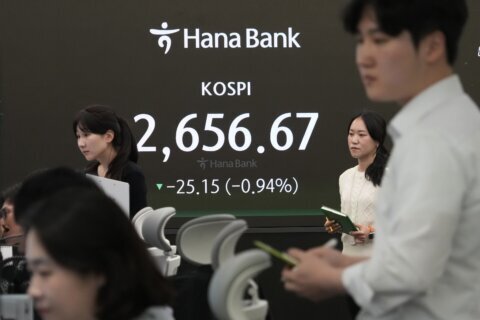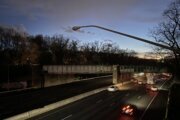HONG KONG (AP) — The trial of the first person to be charged under Hong Kong’s sweeping national security law ended Tuesday after nearly a month, and observers are awaiting a verdict to see how similar cases might be dealt with.
Tong Ying-kit, 24, was accused of driving his motorbike into a group of police officers while carrying a flag bearing the protest slogan “Liberate Hong Kong, Revolution of our times” on July 1 last year, a day after the national security law was imposed by Beijing.
He pleaded not guilty to charges of inciting secession, terrorism and an alternative charge of dangerous driving.
The trial was held in the High Court with no jury, a departure from the common law system in Hong Kong. A verdict will be handed down on July 27, with life imprisonment the maximum penalty if he is found guilty.
National security cases may proceed with no jury if state secrets need to be protected, foreign forces are involved, or if the personal safety of jurors need to be protected. Trials are presided over by judges handpicked by Hong Kong leader Carrie Lam.
The national security law was imposed on semiautonomous Hong Kong by Beijing following months of anti-government protests by those upset by China’s growing influence over the former British colony. It outlaws secession, subversion, terrorism and foreign collusion to intervene in the city’s affairs.
Authorities have also banned the protest slogan “Liberate Hong Kong, Revolution of our times”, stating that it has secessionist connotations.
The legislation and the crackdown on dissent that has accompanied it have drawn international condemnation. Critics say that the national security law further infringes the freedom Hong Kong was promised it could maintain when it was handed to Chinese control from Britain in 1997.
More than 100 people have been arrested under the security legislation.
Tong’s case is being closely watched for clues on how Hong Kong authorities will handle other national security cases.
In this case, the interpretation of the protest slogan is key. Prosecutors say that secession could be one of the interpretations of the “Liberate Hong Kong, Revolution of our times” slogan, and that Tong knowingly incited secession by carrying the flag and driving into the police officers.
Tong’s defense lawyer however argue that there are multiple interpretations of such a slogan and it is not possible to prove that Tong was inciting secession. The defense also says that there is no evidence that Tong committed the act deliberately, and that he had avoided crashing into officers.
The defense also said that Tong’s actions should not be considered terrorism as there was no serious violence or harm to society.
___
AP news assistants Matthew Cheng and Janice Lo contributed to this report.
Copyright © 2024 The Associated Press. All rights reserved. This material may not be published, broadcast, written or redistributed.






